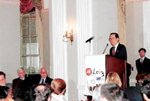Vice-Premier Qian Qichen on China-US TiesIn a speech entitled "China and Asia in the New Century," delivered at a luncheon hosted in his honor by Asia Society in New York, Qian said the Taiwan question is the most important and sensitive issue in China-US relations, and that it must be taken seriously and handled properly. Qian said: "There is only one China in the world. Both the mainland and Taiwan are part of China. China's sovereignty and territorial integrity brook no division." He said the Chinese government stands for peaceful reunification. "That is to say, we will try to resolve the Taiwan question through peaceful means. This conforms to the interests of the Chinese people on both sides of the Taiwan Straits and the interests of all people, including Americans," Qian said. "It is fair to say that nobody is more eager to see a peaceful resolution than we are. But we alone cannot achieve it," he said. Qian went on to say that "the Chinese government is ready to work together with the US government for a healthy, stable and steady development of our relations on the basis of the three China-US Joint communiqu¨¦s." "We appreciate the consistent US statement on its support of the one China policy. We have reasons to expect the US to support China's peaceful reunification," he said. He also said China and the United States have no reason to become rivals or enemies. "We have plenty of reasons to become friends and partners," he noted. The Chinese vice-premier also answered questions from participants at the luncheon, hosted by Asia Society in association with China Institute, Committee of 100 and the National Committee on American Foreign Policy. The luncheon was presided over by Nicholas Platt, president of Asia Society, America's leading institution dedicated to fostering understanding of Asia and communication between Americans and the peoples of Asia and the Pacific. China's Foreign PolicyQian Qichen said that the basic objective of China's foreign policy in the new century is to strive for a peaceful international environment for economic development at home.In the speech Qian said China will continue to follow an independent foreign policy of peace and develop friendly relations and cooperation with all countries in the world. He said that China advocates a new security concept. "We should try to build up mutual trust through consultations and dialogue on an equal footing. We should seek common security. This is the only way to ensure peace and stability. We believe that to seek absolute security for oneself through stronger military alliance and intensified arms race is out of tune with the trend of the times. It won't lead to an effective security at all." He said China stands for democracy in international relations. "We believe that all countries are equal members of the international community, regardless of their size, strength and wealth. National affairs of a country should be decided by its people while international affairs should be handled by all countries together through consultations on an equal footing." Qian also said that China, which will take an active part in the process of economic globalization, will offer the world a larger and more open market, an improved legal system and a better investment climate in its 10th Five-Year Plan period ending 2005. The Chinese vice premier also said that as host for the 9th APEC Economic Leaders' Meeting scheduled to be held in Shanghai this fall, China will try its best to ensure the success of the meeting. The luncheon was hosted by Asia Society, in association with China Institute, Committee of 100 and the National Committee on American Foreign Policy. Situation in AsiaThe Vice-Premier expressed full confidence in Asia's development despite problems confronting the region.Qian said that Asia is, on the whole, moving towards relaxation. "To strengthen dialogue and cooperation, maintain regional stability, and promote common development has become core policies of Asian countries. Concerted efforts of the countries concerned have paid off. Some regional hot spots have gradually cooled off. A case in point is the historic breakthrough in the peace process on the Korean Peninsula," Qian said. He said the Asian economy has continued to turn for the better, and that Asian countries have gradually recovered from the financial crisis, which started in July 1997. However, he added, economic globalization, which has picked up speed, has brought about profound changes to the political, economic, cultural and social fabrics of Asia, and presents all countries in the region both huge opportunities and grave challenges. "But we still have full confidence in Asia's development," Qian said, citing the facts that the region contributes to a quarter of the world's Gross Domestic Product and more than half of its total foreign exchange reserve, that Asian countries have a good economic foundation and great potentials, and that the Asian people have an unyielding national spirit and great creativity. On Tuesday morning, Qian Qichen had breakfast together with chief executive officers of leading U.S. news media. He said during the breakfast that the purpose of his current visit is to get in touch with the new administration of President George W. Bush, to strive for the steady development of China-US relations through common efforts. Qian also said that China and the United States should consolidate and promote their cooperation in areas where they have common interest and in areas where they differ, and they can seek common ground while reserving their differences. Moreover, he said, China has always attached importance to the influence that U.S. media have on the growth of China-US ties and is willing to strengthen communication and cooperation with them. |
| People's Daily Online --- http://english.peopledaily.com.cn/ |
